Deck 34: Leaf Structure and Function
Question
Question
Question
Question
Question
Question
Question
Question
Question
Question
Question
Question
Question
Question
Question
Question
Question
Question
Question
Question
Question
Question
Question
Question
Question
Question
Question
Question
Question
Question
Question
Question
Question
Question
Question
Question
Question
Question
Question
Question
Question
Question
Question
Question
Question
Question
Question
Question
Question
Question
Question
Question
Question
Question
Question
Question
Question
Question
Question
Question
Question
Question
Question
Question
Question
Question
Question
Match between columns
Question
Match between columns
Question
Question
Match between columns
Question
Match between columns
Question
Question
Question
Match between columns
Question
Question
Question
Question
Match between columns
Question
Match between columns
Question

Unlock Deck
Sign up to unlock the cards in this deck!
Unlock Deck
Unlock Deck
1/90
Play
Full screen (f)
Deck 34: Leaf Structure and Function
1
Which of the following are responsible for opening and closing the stoma?
A) Companion cells
B) Cuticle cells
C) Cork cells
D) Sclerenchyma cells
E) Guard cells
A) Companion cells
B) Cuticle cells
C) Cork cells
D) Sclerenchyma cells
E) Guard cells
E
2
Stomata are:
A) waxy layers that cover leaves.
B) openings in the leaf epidermis.
C) extensions of bundle sheaths.
D) particularly numerous on the upper epidermis.
E) guarded by two stipule cells.
A) waxy layers that cover leaves.
B) openings in the leaf epidermis.
C) extensions of bundle sheaths.
D) particularly numerous on the upper epidermis.
E) guarded by two stipule cells.
B
3
Mesophyll cells are:
A) arranged tightly together.
B) separated by intercellular spaces.
C) responsible for the opening and closing of stomata.
D) devoid of chloroplasts.
E) covered by a waxy cuticle, which they secrete.
A) arranged tightly together.
B) separated by intercellular spaces.
C) responsible for the opening and closing of stomata.
D) devoid of chloroplasts.
E) covered by a waxy cuticle, which they secrete.
B
4
The middle portion of a leaf that is sandwiched between the upper and the lower epidermis is called the:
A) mesoderm.
B) middle lamella.
C) mesophyte.
D) bundle sheath.
E) mesophyll.
A) mesoderm.
B) middle lamella.
C) mesophyte.
D) bundle sheath.
E) mesophyll.

Unlock Deck
Unlock for access to all 90 flashcards in this deck.
Unlock Deck
k this deck
5
Figure 34-1
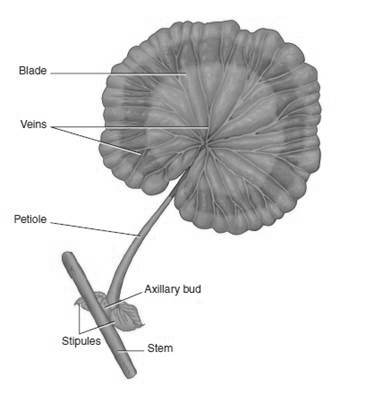
Which of the following is a leaf arrangement in which three or more leaves grow at each node?
A) Netted
B) Parallel
C) Whorled
D) Opposite
E) Alternate

Which of the following is a leaf arrangement in which three or more leaves grow at each node?
A) Netted
B) Parallel
C) Whorled
D) Opposite
E) Alternate

Unlock Deck
Unlock for access to all 90 flashcards in this deck.
Unlock Deck
k this deck
6
Which of the following reduces water loss from plant epidermal cell exterior walls?
A) Cellulose
B) Lignin
C) Hemicellulose
D) Starch
E) Cuticle
A) Cellulose
B) Lignin
C) Hemicellulose
D) Starch
E) Cuticle

Unlock Deck
Unlock for access to all 90 flashcards in this deck.
Unlock Deck
k this deck
7
Leaves:
A) represent a fairly small fraction of the overall metabolic budget for a plant.
B) depend on the roots to supply CO2.
C) are the main photosynthetic organ of most plants.
D) are the main site of water uptake in plants.
E) prevent CO2 and O2 from entering the plant.
A) represent a fairly small fraction of the overall metabolic budget for a plant.
B) depend on the roots to supply CO2.
C) are the main photosynthetic organ of most plants.
D) are the main site of water uptake in plants.
E) prevent CO2 and O2 from entering the plant.

Unlock Deck
Unlock for access to all 90 flashcards in this deck.
Unlock Deck
k this deck
8
Which of the following is a leaf arrangement in which there is one leaf at each node?
A) Netted
B) Parallel
C) Whorled
D) Opposite
E) Alternate
A) Netted
B) Parallel
C) Whorled
D) Opposite
E) Alternate

Unlock Deck
Unlock for access to all 90 flashcards in this deck.
Unlock Deck
k this deck
9
Compound leaves have:
A) parallel veins instead of netted veins.
B) alternate leaf attachment instead of opposite leaf attachment.
C) palmately netted leaves instead of pinnately netted leaves.
D) two or more leaflets instead of a single blade.
E) many leaves per plant instead of a single leaf per plant.
A) parallel veins instead of netted veins.
B) alternate leaf attachment instead of opposite leaf attachment.
C) palmately netted leaves instead of pinnately netted leaves.
D) two or more leaflets instead of a single blade.
E) many leaves per plant instead of a single leaf per plant.

Unlock Deck
Unlock for access to all 90 flashcards in this deck.
Unlock Deck
k this deck
10
Figure 34-2
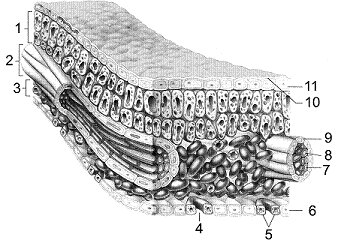
The photosynthetic ground tissue of the leaf is termed which of the following?
A) Guard cells
B) Epidermal cells
C) Stoma
D) Mesophyll
E) Subsidiary cells

The photosynthetic ground tissue of the leaf is termed which of the following?
A) Guard cells
B) Epidermal cells
C) Stoma
D) Mesophyll
E) Subsidiary cells

Unlock Deck
Unlock for access to all 90 flashcards in this deck.
Unlock Deck
k this deck
11
Floating leaves of aquatic plants have:
A) stomata only on the lower epidermis.
B) stomata only on the upper epidermis.
C) stomata on both the lower and the upper epidermis.
D) no stomata on the epidermis.
E) stomata only within the mesophyll.
A) stomata only on the lower epidermis.
B) stomata only on the upper epidermis.
C) stomata on both the lower and the upper epidermis.
D) no stomata on the epidermis.
E) stomata only within the mesophyll.

Unlock Deck
Unlock for access to all 90 flashcards in this deck.
Unlock Deck
k this deck
12
Usually the only epidermal cells with chloroplasts are:
A) stomata.
B) stoma.
C) parenchyma.
D) guard cells.
E) all of these.
A) stomata.
B) stoma.
C) parenchyma.
D) guard cells.
E) all of these.

Unlock Deck
Unlock for access to all 90 flashcards in this deck.
Unlock Deck
k this deck
13
The area of the angle between the stem and the petiole is referred to as the:
A) axil.
B) blade.
C) petiole.
D) stipule.
E) trichome.
A) axil.
B) blade.
C) petiole.
D) stipule.
E) trichome.

Unlock Deck
Unlock for access to all 90 flashcards in this deck.
Unlock Deck
k this deck
14
Photosynthesis occurs mainly in the leaf's:
A) subsidiary cells.
B) bundle sheath extensions.
C) palisade mesophyll.
D) trichomes.
E) vascular bundles.
A) subsidiary cells.
B) bundle sheath extensions.
C) palisade mesophyll.
D) trichomes.
E) vascular bundles.

Unlock Deck
Unlock for access to all 90 flashcards in this deck.
Unlock Deck
k this deck
15
Looking for which of the following is useful for determining whether a plant has simple or compound leaves?
A) Stipules
B) Veins
C) Petioles
D) Nodes
E) Axillary buds
A) Stipules
B) Veins
C) Petioles
D) Nodes
E) Axillary buds

Unlock Deck
Unlock for access to all 90 flashcards in this deck.
Unlock Deck
k this deck
16
Figure 34-1
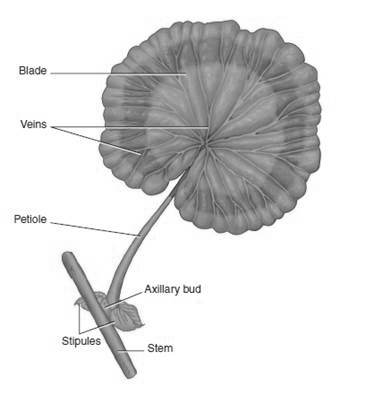
Which of the following is a leaf arrangement in which two leaves grow at each node?
A) Netted
B) Parallel
C) Whorled
D) Opposite
E) Alternate

Which of the following is a leaf arrangement in which two leaves grow at each node?
A) Netted
B) Parallel
C) Whorled
D) Opposite
E) Alternate

Unlock Deck
Unlock for access to all 90 flashcards in this deck.
Unlock Deck
k this deck
17
Trichomes on plants are responsible for:
A) preventing water absorption on leaf surfaces.
B) deterring herbivores.
C) absorbing salts absorbed from the air.
D) the waxy structures on the petiole.
E) facilitating gas exchange.
A) preventing water absorption on leaf surfaces.
B) deterring herbivores.
C) absorbing salts absorbed from the air.
D) the waxy structures on the petiole.
E) facilitating gas exchange.

Unlock Deck
Unlock for access to all 90 flashcards in this deck.
Unlock Deck
k this deck
18
Figure 34-2
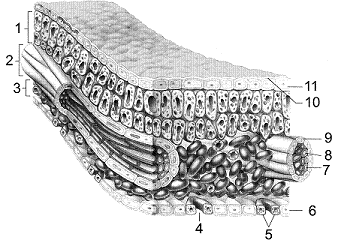
The organization of tissues in the accompanying figure is characteristic of a:
A) stem.
B) spine.
C) leaf blade.
D) petiole.
E) bud scale.

The organization of tissues in the accompanying figure is characteristic of a:
A) stem.
B) spine.
C) leaf blade.
D) petiole.
E) bud scale.

Unlock Deck
Unlock for access to all 90 flashcards in this deck.
Unlock Deck
k this deck
19
Which statement describes the leaf epidermis?
A) Its cells lack chloroplasts.
B) Some of its cells perform photosynthesis.
C) Its cell walls are thin.
D) Its cells are opaque.
E) It has only a single layer.
A) Its cells lack chloroplasts.
B) Some of its cells perform photosynthesis.
C) Its cell walls are thin.
D) Its cells are opaque.
E) It has only a single layer.

Unlock Deck
Unlock for access to all 90 flashcards in this deck.
Unlock Deck
k this deck
20
Figure 34-2
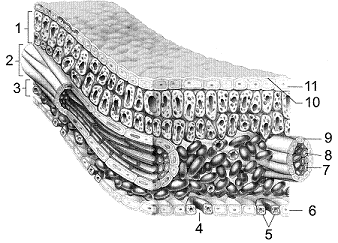
In the accompanying figure, the palisade mesophyll is labeled with the number:
A) 1
B) 2
C) 3
D) 6
E) 9

In the accompanying figure, the palisade mesophyll is labeled with the number:
A) 1
B) 2
C) 3
D) 6
E) 9

Unlock Deck
Unlock for access to all 90 flashcards in this deck.
Unlock Deck
k this deck
21
Which structure or structures function to open and close the stomata?
A) Cuticle
B) Mesophyll
C) Palisade cells
D) Guard cells
E) Chloroplasts
A) Cuticle
B) Mesophyll
C) Palisade cells
D) Guard cells
E) Chloroplasts

Unlock Deck
Unlock for access to all 90 flashcards in this deck.
Unlock Deck
k this deck
22
The process of photosynthesis involves the conversion of:
A) oxygen and water into sugar.
B) sugar into starches and cellulose.
C) oxygen and sugar into water.
D) carbon dioxide and water into sugar.
E) sugar and water into lipids.
A) oxygen and water into sugar.
B) sugar into starches and cellulose.
C) oxygen and sugar into water.
D) carbon dioxide and water into sugar.
E) sugar and water into lipids.

Unlock Deck
Unlock for access to all 90 flashcards in this deck.
Unlock Deck
k this deck
23
The pigment involved in stomatal opening and closing is which of the following colors?
A) Red
B) Orange
C) Yellow
D) Green
E) Blue
A) Red
B) Orange
C) Yellow
D) Green
E) Blue

Unlock Deck
Unlock for access to all 90 flashcards in this deck.
Unlock Deck
k this deck
24
Which change is most important in stomatal closing?
A) Declining sucrose concentrations
B) Rising sucrose concentrations
C) Rising potassium concentrations
D) Declining potassium concentrations
E) Declining chloride concentrations
A) Declining sucrose concentrations
B) Rising sucrose concentrations
C) Rising potassium concentrations
D) Declining potassium concentrations
E) Declining chloride concentrations

Unlock Deck
Unlock for access to all 90 flashcards in this deck.
Unlock Deck
k this deck
25
If a plant were placed in continual darkness, it would continue to open and close its stomata at approximately the same time each day. This phenomenon is governed by:
A) annual rhythms.
B) floral clocks.
C) transpiration.
D) temporal mechanisms.
E) circadian rhythms.
A) annual rhythms.
B) floral clocks.
C) transpiration.
D) temporal mechanisms.
E) circadian rhythms.

Unlock Deck
Unlock for access to all 90 flashcards in this deck.
Unlock Deck
k this deck
26
Which of the following are the only plant epidermal cells that are photosynthetic?
A) Guard cells
B) Epidermal cells
C) Stoma
D) Mesophyll
E) Subsidiary cells
A) Guard cells
B) Epidermal cells
C) Stoma
D) Mesophyll
E) Subsidiary cells

Unlock Deck
Unlock for access to all 90 flashcards in this deck.
Unlock Deck
k this deck
27
The rate of transpiration decreases under which of the following conditions?
A) Increased wind
B) Increased humidity
C) Increased temperature
D) Presence of sunlight
E) An increase in dry air
A) Increased wind
B) Increased humidity
C) Increased temperature
D) Presence of sunlight
E) An increase in dry air

Unlock Deck
Unlock for access to all 90 flashcards in this deck.
Unlock Deck
k this deck
28
Which of the following wavelengths of light trigger stomatal opening?
A) 300 to 400 nm
B) 400 to 500 nm
C) 500 to 600 nm
D) 600 to 700 nm
E) 700 to 800 nm
A) 300 to 400 nm
B) 400 to 500 nm
C) 500 to 600 nm
D) 600 to 700 nm
E) 700 to 800 nm

Unlock Deck
Unlock for access to all 90 flashcards in this deck.
Unlock Deck
k this deck
29
Guttation typically occurs:
A) at noon.
B) at dawn.
C) at dusk.
D) at night.
E) when the sun is at its peak.
A) at noon.
B) at dawn.
C) at dusk.
D) at night.
E) when the sun is at its peak.

Unlock Deck
Unlock for access to all 90 flashcards in this deck.
Unlock Deck
k this deck
30
Photosynthesis reduces the leaf's internal concentration of:
A) hydrogen.
B) carbon dioxide.
C) nitrogen.
D) oxygen.
E) sugars and starches.
A) hydrogen.
B) carbon dioxide.
C) nitrogen.
D) oxygen.
E) sugars and starches.

Unlock Deck
Unlock for access to all 90 flashcards in this deck.
Unlock Deck
k this deck
31
The needles of pines and other conifers are adapted to:
A) conserve water.
B) defend against herbivores.
C) reduce the effects of intense sunlight.
D) reduce the effects of snow and ice.
E) reduce the effects of wind.
A) conserve water.
B) defend against herbivores.
C) reduce the effects of intense sunlight.
D) reduce the effects of snow and ice.
E) reduce the effects of wind.

Unlock Deck
Unlock for access to all 90 flashcards in this deck.
Unlock Deck
k this deck
32
The primary function of the spongy mesophyll is to allow which of the following processes?
A) Gas diffusion, particularly CO2, within the leaf
B) Light capture
C) Energy production
D) Energy storage
E) Water transport
A) Gas diffusion, particularly CO2, within the leaf
B) Light capture
C) Energy production
D) Energy storage
E) Water transport

Unlock Deck
Unlock for access to all 90 flashcards in this deck.
Unlock Deck
k this deck
33
Which of the following is true of monocot leaves?
A) Many monocots have a distinct palisade layer.
B) Many monocots lack a petiole.
C) Many monocots have a distinct spongy layer.
D) Many monocot leaves are broad.
E) Many monocot leaves have netted venation.
A) Many monocots have a distinct palisade layer.
B) Many monocots lack a petiole.
C) Many monocots have a distinct spongy layer.
D) Many monocot leaves are broad.
E) Many monocot leaves have netted venation.

Unlock Deck
Unlock for access to all 90 flashcards in this deck.
Unlock Deck
k this deck
34
After light triggers the activation proton pumps, what happens next in the leaf?
A) Chloride ions are pumped out of the guard cells.
B) Hydrogen ions are actively transported out of guard cells.
C) Potassium ions diffuse into guard cells.
D) Chloride ions diffuse out of guard cells.
E) Water moves by osmosis into guard cells.
A) Chloride ions are pumped out of the guard cells.
B) Hydrogen ions are actively transported out of guard cells.
C) Potassium ions diffuse into guard cells.
D) Chloride ions diffuse out of guard cells.
E) Water moves by osmosis into guard cells.

Unlock Deck
Unlock for access to all 90 flashcards in this deck.
Unlock Deck
k this deck
35
The primary function of spongy mesophyll is:
A) photosynthesis.
B) transpiration.
C) to allow diffusion of gases.
D) transport of substances.
E) transport of water.
A) photosynthesis.
B) transpiration.
C) to allow diffusion of gases.
D) transport of substances.
E) transport of water.

Unlock Deck
Unlock for access to all 90 flashcards in this deck.
Unlock Deck
k this deck
36
Monocot leaves typically have:
A) alternately palmate venation.
B) netted venation.
C) parallel venation.
D) alternately pinnate venation.
E) no venation.
A) alternately palmate venation.
B) netted venation.
C) parallel venation.
D) alternately pinnate venation.
E) no venation.

Unlock Deck
Unlock for access to all 90 flashcards in this deck.
Unlock Deck
k this deck
37
Which of the following contains dissolved sugars?
A) Xylem
B) Phloem
C) Stoma
D) Mesophyll
E) Stipules
A) Xylem
B) Phloem
C) Stoma
D) Mesophyll
E) Stipules

Unlock Deck
Unlock for access to all 90 flashcards in this deck.
Unlock Deck
k this deck
38
Opening and closing of the stomata:
A) occur during prolonged periods of drought.
B) occur when there is a high concentration of carbon dioxide in the leaf.
C) are under hormonal control.
D) are triggered by darkness.
E) are controlled by the changes in shape of the companion cells.
A) occur during prolonged periods of drought.
B) occur when there is a high concentration of carbon dioxide in the leaf.
C) are under hormonal control.
D) are triggered by darkness.
E) are controlled by the changes in shape of the companion cells.

Unlock Deck
Unlock for access to all 90 flashcards in this deck.
Unlock Deck
k this deck
39
Eudicot leaves typically have:
A) alternately palmate venation.
B) netted venation.
C) parallel venation.
D) alternately pinnate venation.
E) no venation.
A) alternately palmate venation.
B) netted venation.
C) parallel venation.
D) alternately pinnate venation.
E) no venation.

Unlock Deck
Unlock for access to all 90 flashcards in this deck.
Unlock Deck
k this deck
40
The process by which water is lost by evaporation from aerial plant parts is known as:
A) vaporization.
B) photosynthesis.
C) guttation.
D) transpiration.
E) abscission.
A) vaporization.
B) photosynthesis.
C) guttation.
D) transpiration.
E) abscission.

Unlock Deck
Unlock for access to all 90 flashcards in this deck.
Unlock Deck
k this deck
41
Modified leaves that protect meristematic tissue at the tips of woody plants are known as:
A) bulbs.
B) bud scales.
C) spines.
D) tendrils.
E) scale scars.
A) bulbs.
B) bud scales.
C) spines.
D) tendrils.
E) scale scars.

Unlock Deck
Unlock for access to all 90 flashcards in this deck.
Unlock Deck
k this deck
42
Explain the difference between guttation and transpiration.

Unlock Deck
Unlock for access to all 90 flashcards in this deck.
Unlock Deck
k this deck
43
Identify and describe:
A. three different ways in which leaves can be arranged on stems, and list one example for each.
B. three different venation patterns in leaves and whether each is characteristic of eudicots or monocots.
A. three different ways in which leaves can be arranged on stems, and list one example for each.
B. three different venation patterns in leaves and whether each is characteristic of eudicots or monocots.

Unlock Deck
Unlock for access to all 90 flashcards in this deck.
Unlock Deck
k this deck
44
A leaf without a blade is said to be sessile.

Unlock Deck
Unlock for access to all 90 flashcards in this deck.
Unlock Deck
k this deck
45
One benefit of transpiration is that it:
A) concentrates nutrients in plant leaves.
B) distributes nutrients throughout the plant.
C) moves water from the atmosphere to the plant.
D) is responsible for warming plants.
E) brings in water from the soil.
A) concentrates nutrients in plant leaves.
B) distributes nutrients throughout the plant.
C) moves water from the atmosphere to the plant.
D) is responsible for warming plants.
E) brings in water from the soil.

Unlock Deck
Unlock for access to all 90 flashcards in this deck.
Unlock Deck
k this deck
46
Excess transpiration:
A) may be harmful to a plant.
B) causes an increase in turgor pressure.
C) is a synonym for precipitation.
D) occurs mainly in the winter.
E) is automatically counteracted by absorbing water from the soil.
A) may be harmful to a plant.
B) causes an increase in turgor pressure.
C) is a synonym for precipitation.
D) occurs mainly in the winter.
E) is automatically counteracted by absorbing water from the soil.

Unlock Deck
Unlock for access to all 90 flashcards in this deck.
Unlock Deck
k this deck
47
Leaf abscission:
A) occurs as a response to increased temperatures in temperate climates.
B) occurs as a response to dry conditions in tropical climates.
C) involves the formation of a tendril at the base of the petiole.
D) occurs year-round on deciduous plants.
E) does not occur in conifers.
A) occurs as a response to increased temperatures in temperate climates.
B) occurs as a response to dry conditions in tropical climates.
C) involves the formation of a tendril at the base of the petiole.
D) occurs year-round on deciduous plants.
E) does not occur in conifers.

Unlock Deck
Unlock for access to all 90 flashcards in this deck.
Unlock Deck
k this deck
48
Most carnivorous plants grow in poor soil that is deficient in certain essential elements, especially which of the following elements?
A) Potassium
B) Sodium
C) Nitrogen
D) Oxygen
E) Sulfur
A) Potassium
B) Sodium
C) Nitrogen
D) Oxygen
E) Sulfur

Unlock Deck
Unlock for access to all 90 flashcards in this deck.
Unlock Deck
k this deck
49
The release of liquid water by leaves when soil moisture is high is known as:
A) vaporization.
B) photosynthesis.
C) guttation.
D) transpiration.
E) abscission.
A) vaporization.
B) photosynthesis.
C) guttation.
D) transpiration.
E) abscission.

Unlock Deck
Unlock for access to all 90 flashcards in this deck.
Unlock Deck
k this deck
50
The spines of a cactus are actually modified:
A) branches.
B) stems.
C) leaves.
D) roots.
E) trichomes.
A) branches.
B) stems.
C) leaves.
D) roots.
E) trichomes.

Unlock Deck
Unlock for access to all 90 flashcards in this deck.
Unlock Deck
k this deck
51
Which of the following have tendrils that are specialized stems (NOT specialized leaves)?
A) Peas
B) Cucumbers
C) Squash
D) Sweet peas
E) Ivy
A) Peas
B) Cucumbers
C) Squash
D) Sweet peas
E) Ivy

Unlock Deck
Unlock for access to all 90 flashcards in this deck.
Unlock Deck
k this deck
52
Which event is associated with leaf abscission?
A) Chlorophyll breaks down.
B) Anthocyanins degrade.
C) Carotenoids are transported from the leaves.
D) Sugars accumulate in the leaves.
E) Leaves turn dark green.
A) Chlorophyll breaks down.
B) Anthocyanins degrade.
C) Carotenoids are transported from the leaves.
D) Sugars accumulate in the leaves.
E) Leaves turn dark green.

Unlock Deck
Unlock for access to all 90 flashcards in this deck.
Unlock Deck
k this deck
53
The area where the petiole detaches from the stem is referred to as the:
A) abscission zone.
B) middle lamella.
C) bundle sheath extension.
D) terminal bud.
E) bud scale scar.
A) abscission zone.
B) middle lamella.
C) bundle sheath extension.
D) terminal bud.
E) bud scale scar.

Unlock Deck
Unlock for access to all 90 flashcards in this deck.
Unlock Deck
k this deck
54
Underground stems with fleshy leaves used for storage of water and food are known as:
A) tendrils.
B) spines.
C) bulbs.
D) buds.
E) stipules.
A) tendrils.
B) spines.
C) bulbs.
D) buds.
E) stipules.

Unlock Deck
Unlock for access to all 90 flashcards in this deck.
Unlock Deck
k this deck
55
An alternate leaf arrangement is one in which there is one leaf per node.

Unlock Deck
Unlock for access to all 90 flashcards in this deck.
Unlock Deck
k this deck
56
Parallel venation is characteristic of eudicot leaves.

Unlock Deck
Unlock for access to all 90 flashcards in this deck.
Unlock Deck
k this deck
57
Insectivorous plants:
A) typically grow in nutrient-rich soil.
B) enhance a poor supply of CO2 through capturing prey.
C) use modified leaves to trap their prey.
D) require symbiotic insects and insect larvae to digest their prey.
E) require microorganisms to digest their prey.
A) typically grow in nutrient-rich soil.
B) enhance a poor supply of CO2 through capturing prey.
C) use modified leaves to trap their prey.
D) require symbiotic insects and insect larvae to digest their prey.
E) require microorganisms to digest their prey.

Unlock Deck
Unlock for access to all 90 flashcards in this deck.
Unlock Deck
k this deck
58
Compare the leaf structure of monocots and eudicots.

Unlock Deck
Unlock for access to all 90 flashcards in this deck.
Unlock Deck
k this deck
59
Subsidiary cells are the only epidermal cells that have chloroplasts.

Unlock Deck
Unlock for access to all 90 flashcards in this deck.
Unlock Deck
k this deck
60
Which of the following substances may protect leaves against damage by ultraviolet radiation after abscission?
A) Anthocyanins
B) Coumarins
C) Auxins
D) Coumadins
E) Gibberellins
A) Anthocyanins
B) Coumarins
C) Auxins
D) Coumadins
E) Gibberellins

Unlock Deck
Unlock for access to all 90 flashcards in this deck.
Unlock Deck
k this deck
61
A spine is a modified branch.

Unlock Deck
Unlock for access to all 90 flashcards in this deck.
Unlock Deck
k this deck
62
Explain how blue light triggers the movement of hydrogen and potassium ions across the membranes of guard cells and how this causes opening and closing of the stomata.

Unlock Deck
Unlock for access to all 90 flashcards in this deck.
Unlock Deck
k this deck
63
Palisade mesophyll is a tissue typically found on the side of the leaf toward the upper epidermis.

Unlock Deck
Unlock for access to all 90 flashcards in this deck.
Unlock Deck
k this deck
64
Describe the benefits of transpiration to plants.

Unlock Deck
Unlock for access to all 90 flashcards in this deck.
Unlock Deck
k this deck
65
The bundle sheath typically surrounds the larger veins.

Unlock Deck
Unlock for access to all 90 flashcards in this deck.
Unlock Deck
k this deck
66
Red light has a wavelength that is the most effective for triggering stomatal opening.

Unlock Deck
Unlock for access to all 90 flashcards in this deck.
Unlock Deck
k this deck
67
Match between columns

Unlock Deck
Unlock for access to all 90 flashcards in this deck.
Unlock Deck
k this deck
68
Match between columns

Unlock Deck
Unlock for access to all 90 flashcards in this deck.
Unlock Deck
k this deck
69
Guttation is the process most responsible for moving water and minerals through the plant.

Unlock Deck
Unlock for access to all 90 flashcards in this deck.
Unlock Deck
k this deck
70
Match between columns

Unlock Deck
Unlock for access to all 90 flashcards in this deck.
Unlock Deck
k this deck
71
Match between columns

Unlock Deck
Unlock for access to all 90 flashcards in this deck.
Unlock Deck
k this deck
72
Leaf abscission is initiated and orchestrated by the hormone abscisic acid.

Unlock Deck
Unlock for access to all 90 flashcards in this deck.
Unlock Deck
k this deck
73
A cross section of a monocot leaf typically shows veins in both cross-section and lengthwise section.

Unlock Deck
Unlock for access to all 90 flashcards in this deck.
Unlock Deck
k this deck
74
Match between columns

Unlock Deck
Unlock for access to all 90 flashcards in this deck.
Unlock Deck
k this deck
75
Explain how the structure of a leaf contributes to the function of photosynthesis.

Unlock Deck
Unlock for access to all 90 flashcards in this deck.
Unlock Deck
k this deck
76
Stomata close as a result of water moving into guard cells.

Unlock Deck
Unlock for access to all 90 flashcards in this deck.
Unlock Deck
k this deck
77
Most transpiration occurs through stomata.

Unlock Deck
Unlock for access to all 90 flashcards in this deck.
Unlock Deck
k this deck
78
Match between columns

Unlock Deck
Unlock for access to all 90 flashcards in this deck.
Unlock Deck
k this deck
79
Match between columns

Unlock Deck
Unlock for access to all 90 flashcards in this deck.
Unlock Deck
k this deck
80
Transpiration increases at lower temperatures.

Unlock Deck
Unlock for access to all 90 flashcards in this deck.
Unlock Deck
k this deck


